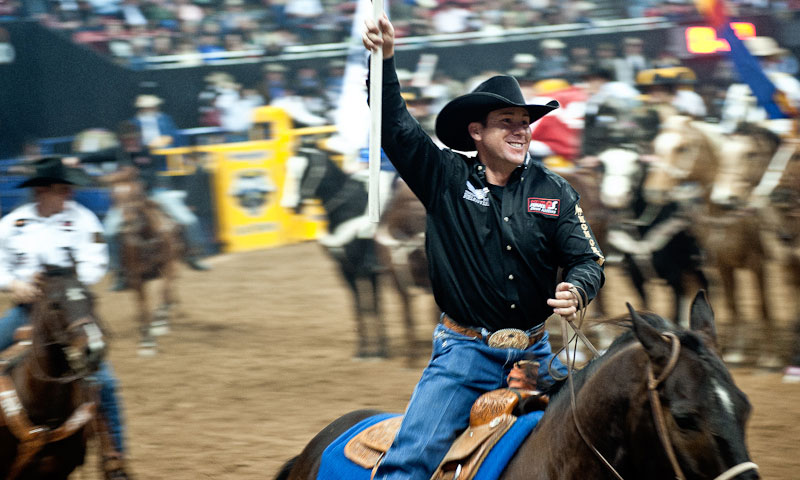
Rodeo at a Crossroads: Top Athletes Move to Leave Association
A move by dozens of major rodeo stars to splinter from the Professional Rodeo Cowboys Association comes at a time when the association is considering a big move of its own—finding a new city to host its biggest event.
A move by dozens of major rodeo stars to splinter from the Professional Rodeo Cowboys Association comes at a time when the association is considering a big change of its own—moving its biggest event to a new city.
They’re the most dangerous eight seconds in sports, but a recent move by a group of professional rodeo athletes makes bull riding seem easy by comparison.
Earlier this month, nearly 100 bull riders, steer wrestlers, ropers, barrel racers, and other rodeo professionals launched a Facebook page to announce their intention to break away from the Professional Rodeo Cowboys Association (PRCA), a sports league that has existed in one form or another for nearly 80 years.
The root issues of the split involve an ongoing conflict in a sport that, while not exactly mainstream, nonetheless is extremely lucrative for both athletes and organizers. More details:
[A]t this point we feel the time has come for the top contestants to be more directly involved in the future of our sport.
Choices questioned: The association looks likely to move its most popular event, the National Finals Rodeo (NFR)—the sport’s equivalent to the Super Bowl—from Las Vegas to Central Florida after 2014. The event, which has been staged in Las Vegas for 29 years, pumps $60 million a year into the local economy. Las Vegas has pushed to counteroffer the more lucrative Florida proposal, which would offer a higher payout than the Las Vegas deal as well as a plan to develop a 24,000-seat arena to host the event. That situation—along with a PRCA decision to turn down a million-dollar television contract with the niche RFD-TV in favor of paying CBS to air the event on broadcast television—is among issues that have spurred governance questions from some of the sport’s biggest stars.
A splinter group forms: Another bone of contention is a failed effort to restructure the PRCA to give more of a voice to the sport’s major athletes. Afterward, star roper Trevor Brazile, a 17-time world champion, led a group of athletes in launching a Facebook page titled “Support Rodeo Contestants.” On the page, the athletes suggested they would create a league of their own in which they would have a greater say in how the organization is run. “We went to the PRCA with a proposal supported by the top cowboys that would have strengthened the PRCA. Unfortunately our proposal was not accepted,” Brazile said in a statement. “We appreciate what the PRCA has done for the sport in the past, but at this point we feel the time has come for the top contestants to be more directly involved in the future of our sport.” The group, which hopes to “create a model that is better for the fans, committees, and top contestants in the sport,” would work to launch the league during the 2015 season to prevent disruptions during 2014—though it emphasized that its original preference was to work within the PRCA’s structure. Early support seems strong: In the two weeks since the announcement was made, the page has garnered more than 25,000 Facebook fans.
The association’s take: For its part, PRCA notes that the potential NFR move is intended to help boost financial winnings for the athletes. An association official also says its decision not to add seats for contestants on the association’s board was due to the current state of flux. “The timing was unfortunate. I understand they are frustrated about some things, but the NFR site hasn’t been determined yet… [W]e’re just in such a limbo at the moment,” PRCA spokesman Jim Bainbridge told the Associated Press.
PRCA could require that rodeo athletes take part only in association-sanctioned events in order to qualify for the NFR. This hasn’t been officially proposed yet, but it would affect the industry’s economic model, as a number of lucrative events are unsanctioned by the PRCA. It also would put additional pressure on event planners, who say they lack clarity about the decision-making process.
If the athletes do leave PRCA, there’s already one successful template for them to follow: Professional Bull Riders, a competitive rodeo organization started by several of that sport’s major athletes as a splinter group from PRCA in 1992, has spawned a tour and grown into a multimillion-dollar business.
Trevor Brazile, a major rodeo star, is one of the key figures in a potential rodeo cowboys splinter group. (photo by joeduty/Flickr)






Comments